运输条款英文解释
- 格式:doc
- 大小:35.50 KB
- 文档页数:4
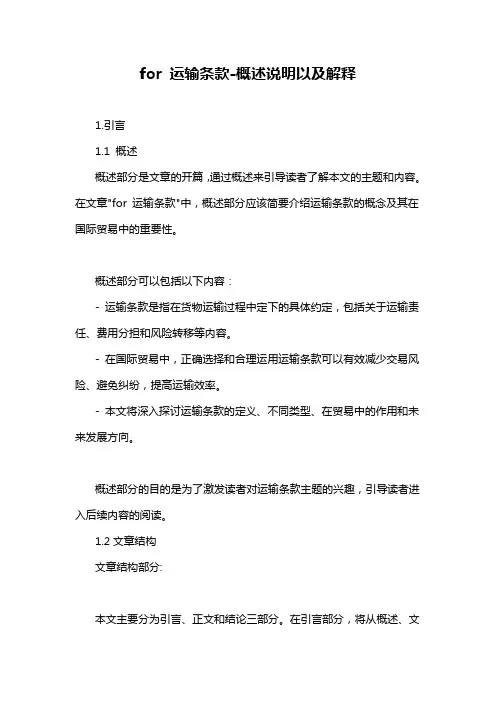
for 运输条款-概述说明以及解释1.引言1.1 概述概述部分是文章的开篇,通过概述来引导读者了解本文的主题和内容。
在文章"for 运输条款"中,概述部分应该简要介绍运输条款的概念及其在国际贸易中的重要性。
概述部分可以包括以下内容:- 运输条款是指在货物运输过程中定下的具体约定,包括关于运输责任、费用分担和风险转移等内容。
- 在国际贸易中,正确选择和合理运用运输条款可以有效减少交易风险、避免纠纷,提高运输效率。
- 本文将深入探讨运输条款的定义、不同类型、在贸易中的作用和未来发展方向。
概述部分的目的是为了激发读者对运输条款主题的兴趣,引导读者进入后续内容的阅读。
1.2文章结构文章结构部分:本文主要分为引言、正文和结论三部分。
在引言部分,将从概述、文章结构和目的三个方面介绍运输条款的重要性。
在正文部分,将分为运输条款的定义、常见的运输条款类型和运输条款在国际贸易中的重要性三个小节展开讨论。
在结论部分,将总结全文内容并提出运输条款的合理选择和展望未来的发展方向。
通过这样的结构安排,将全面深入地探讨运输条款在国际贸易中的作用和影响。
1.3 目的运输条款在国际贸易中扮演着至关重要的角色,其目的在于明确约定双方在运输过程中的责任和义务,以确保货物能够安全、及时地运抵目的地。
通过明确定义每一方的责任范围和义务,可以避免潜在的纠纷和争议,降低货物运输过程中的风险。
同时,合理选择适合的运输条款可以帮助卖方和买方分担运输风险,提高交易的效率和可靠性。
在日益全球化的贸易环境下,了解运输条款并合理选择适用的条款对于保障双方的权益和确保贸易顺利进行至关重要。
因此,本文旨在深入探讨运输条款的定义、类型及其在国际贸易中的重要性,以帮助读者更好地理解和应用运输条款,确保贸易顺利进行。
2.正文2.1 运输条款的定义运输条款是指在商品交易中,买卖双方就运输、交付和责任等问题所达成的协议条款。
它规定了货物的运输方式、费用承担、风险转移等内容,对双方的权利和义务进行了明确的约定。
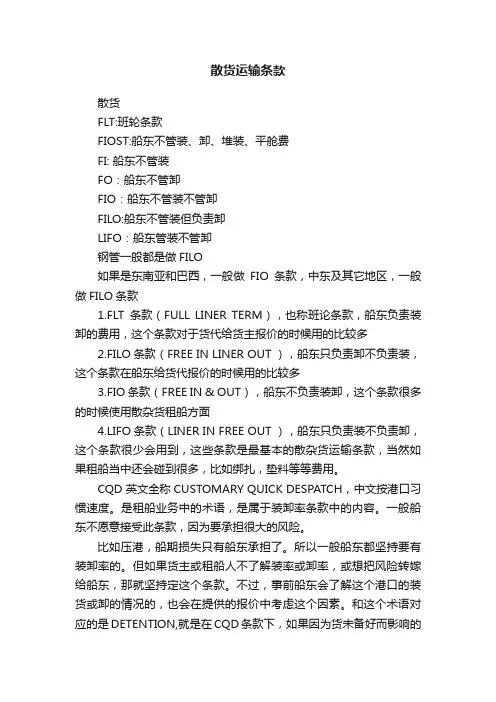
散货运输条款散货FLT:班轮条款FIOST:船东不管装、卸、堆装、平舱费FI: 船东不管装FO:船东不管卸FIO:船东不管装不管卸FILO:船东不管装但负责卸LIFO:船东管装不管卸钢管一般都是做FILO如果是东南亚和巴西,一般做FIO条款,中东及其它地区,一般做FILO条款1.FLT条款(FULL LINER TERM),也称班论条款,船东负责装卸的费用,这个条款对于货代给货主报价的时候用的比较多2.FILO条款(FREE IN LINER OUT ),船东只负责卸不负责装,这个条款在船东给货代报价的时候用的比较多3.FIO条款(FREE IN & OUT),船东不负责装卸,这个条款很多的时候使用散杂货租船方面4.LIFO条款(LINER IN FREE OUT ),船东只负责装不负责卸,这个条款很少会用到,这些条款是最基本的散杂货运输条款,当然如果租船当中还会碰到很多,比如绑扎,垫料等等费用。
CQD 英文全称CUSTOMARY QUICK DESPATCH,中文按港口习惯速度。
是租船业务中的术语,是属于装卸率条款中的内容。
一般船东不愿意接受此条款,因为要承担很大的风险。
比如压港,船期损失只有船东承担了。
所以一般船东都坚持要有装卸率的。
但如果货主或租船人不了解装率或卸率,或想把风险转嫁给船东,那就坚持定这个条款。
不过,事前船东会了解这个港口的装货或卸的情况的,也会在提供的报价中考虑这个因素。
和这个术语对应的是DETENTION,就是在CQD条款下,如果因为货未备好而影响的船期,要根据DETENTION来向货主或租船人索赔损失。
除非船东对装卸港与航线都很了解的情况,而货物本身很有吸引力以及对租家很放心的情况下才会做CQD ,否则一般不会接受的。
一般说:CDQ就是要害死船东的条款。
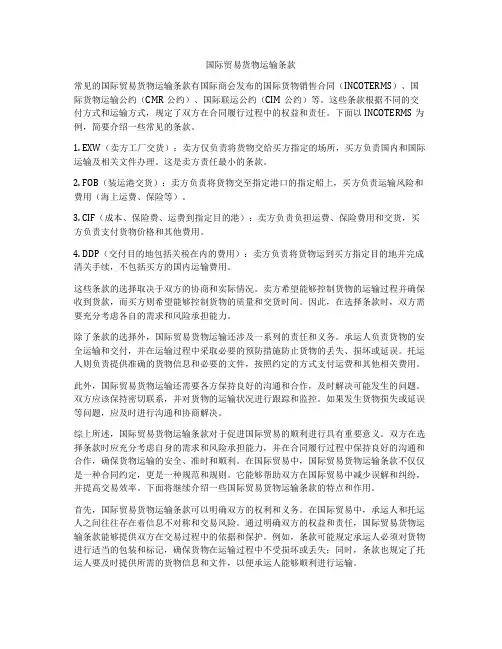
国际贸易货物运输条款常见的国际贸易货物运输条款有国际商会发布的国际货物销售合同(INCOTERMS)、国际货物运输公约(CMR公约)、国际联运公约(CIM公约)等。
这些条款根据不同的交付方式和运输方式,规定了双方在合同履行过程中的权益和责任。
下面以INCOTERMS为例,简要介绍一些常见的条款。
1. EXW(卖方工厂交货):卖方仅负责将货物交给买方指定的场所,买方负责国内和国际运输及相关文件办理。
这是卖方责任最小的条款。
2. FOB(装运港交货):卖方负责将货物交至指定港口的指定船上,买方负责运输风险和费用(海上运费、保险等)。
3. CIF(成本、保险费、运费到指定目的港):卖方负责负担运费、保险费用和交货,买方负责支付货物价格和其他费用。
4. DDP(交付目的地包括关税在内的费用):卖方负责将货物运到买方指定目的地并完成清关手续,不包括买方的国内运输费用。
这些条款的选择取决于双方的协商和实际情况。
卖方希望能够控制货物的运输过程并确保收到货款,而买方则希望能够控制货物的质量和交货时间。
因此,在选择条款时,双方需要充分考虑各自的需求和风险承担能力。
除了条款的选择外,国际贸易货物运输还涉及一系列的责任和义务。
承运人负责货物的安全运输和交付,并在运输过程中采取必要的预防措施防止货物的丢失、损坏或延误。
托运人则负责提供准确的货物信息和必要的文件,按照约定的方式支付运费和其他相关费用。
此外,国际贸易货物运输还需要各方保持良好的沟通和合作,及时解决可能发生的问题。
双方应该保持密切联系,并对货物的运输状况进行跟踪和监控。
如果发生货物损失或延误等问题,应及时进行沟通和协商解决。
综上所述,国际贸易货物运输条款对于促进国际贸易的顺利进行具有重要意义。
双方在选择条款时应充分考虑自身的需求和风险承担能力,并在合同履行过程中保持良好的沟通和合作,确保货物运输的安全、准时和顺利。
在国际贸易中,国际贸易货物运输条款不仅仅是一种合同约定,更是一种规范和规则。
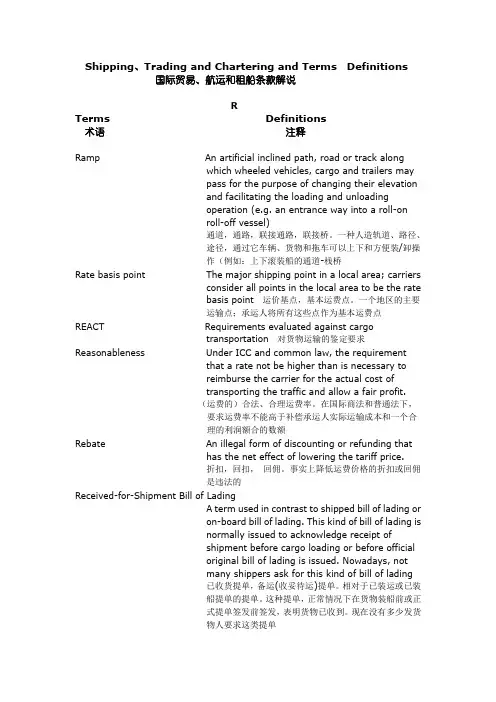
Shipping、Trading and Chartering and Terms Definitions国际贸易、航运和租船条款解说RTerms Definitions术语注释Ramp An artificial inclined path, road or track alongwhich wheeled vehicles, cargo and trailers maypass for the purpose of changing their elevationand facilitating the loading and unloadingoperation (e.g. an entrance way into a roll-onroll-off vessel)通道,通路,联接通路,联接桥。
一种人造轨道、路径、途径,通过它车辆、货物和拖车可以上下和方便装/卸操作(例如:上下滚装船的通道-栈桥Rate basis point The major shipping point in a local area; carriersconsider all points in the local area to be the ratebasis point 运价基点,基本运费点。
一个地区的主要运输点;承运人将所有这些点作为基本运费点REACT Requirements evaluated against cargotransportation 对货物运输的鉴定要求Reasonableness Under ICC and common law, the requirementthat a rate not be higher than is necessary toreimburse the carrier for the actual cost oftransporting the traffic and allow a fair profit.(运费的)合法、合理运费率。
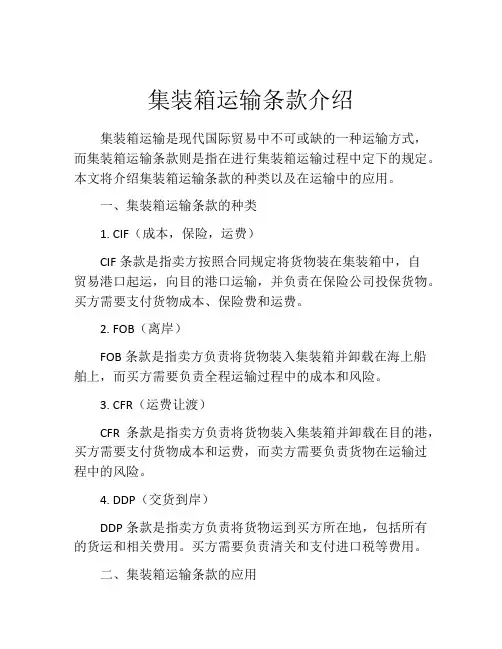
集装箱运输条款介绍集装箱运输是现代国际贸易中不可或缺的一种运输方式,而集装箱运输条款则是指在进行集装箱运输过程中定下的规定。
本文将介绍集装箱运输条款的种类以及在运输中的应用。
一、集装箱运输条款的种类1. CIF(成本,保险,运费)CIF条款是指卖方按照合同规定将货物装在集装箱中,自贸易港口起运,向目的港口运输,并负责在保险公司投保货物。
买方需要支付货物成本、保险费和运费。
2. FOB(离岸)FOB条款是指卖方负责将货物装入集装箱并卸载在海上船舶上,而买方需要负责全程运输过程中的成本和风险。
3. CFR(运费让渡)CFR条款是指卖方负责将货物装入集装箱并卸载在目的港,买方需要支付货物成本和运费,而卖方需要负责货物在运输过程中的风险。
4. DDP(交货到岸)DDP条款是指卖方负责将货物运到买方所在地,包括所有的货运和相关费用。
买方需要负责清关和支付进口税等费用。
二、集装箱运输条款的应用1. 合理选择运输条款买卖双方需要根据货物的性质、运输距离和交货地点等方面的要求,选择合适的运输条款。
比如,对于高价值的货物或者对时间比较敏感的货物,可以选择DDP条款。
2. 注意协商运输细节在协商运输条款时,双方需要详细商定相关的细节。
比如,如何处理货物在运输过程中的损失或损坏,海关报关及税费的负责人等。
只有将这些问题协商清楚,才能避免双方之间的纠纷。
3. 了解国家相关法律法规在进行集装箱运输业务时,双方需要了解各个国家的相关法律法规,避免违反法律而引起的经济损失。
4. 注意安全在进行集装箱运输时,双方需要对货物的安全给予足够的重视。
比如,选择符合标准的集装箱、安全稳固地堆放货物以及妥善保护货物免受自然灾害等风险。
总之,集装箱运输条款是国际贸易中必不可少的一环,对于买卖双方来说,选择合适的运输条款并协商好各个细节是十分重要的。
只有在严格遵守条款和规定的前提下,才能保证货物的安全和顺利运输。
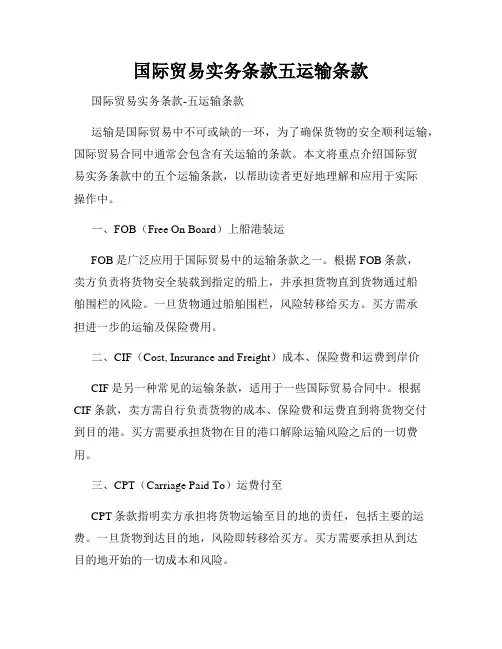
国际贸易实务条款五运输条款国际贸易实务条款-五运输条款运输是国际贸易中不可或缺的一环,为了确保货物的安全顺利运输,国际贸易合同中通常会包含有关运输的条款。
本文将重点介绍国际贸易实务条款中的五个运输条款,以帮助读者更好地理解和应用于实际操作中。
一、FOB(Free On Board)上船港装运FOB是广泛应用于国际贸易中的运输条款之一。
根据FOB条款,卖方负责将货物安全装载到指定的船上,并承担货物直到货物通过船舶围栏的风险。
一旦货物通过船舶围栏,风险转移给买方。
买方需承担进一步的运输及保险费用。
二、CIF(Cost, Insurance and Freight)成本、保险费和运费到岸价CIF是另一种常见的运输条款,适用于一些国际贸易合同中。
根据CIF条款,卖方需自行负责货物的成本、保险费和运费直到将货物交付到目的港。
买方需要承担货物在目的港口解除运输风险之后的一切费用。
三、CPT(Carriage Paid To)运费付至CPT条款指明卖方承担将货物运输至目的地的责任,包括主要的运费。
一旦货物到达目的地,风险即转移给买方。
买方需要承担从到达目的地开始的一切成本和风险。
四、EXW(Ex Works)离岸价EXW是一种适用于国际贸易合同的运输条款。
根据EXW条款,卖方将货物交付给买方指定的地点,此时卖方的责任结束。
买方需要自行承担从卖方处将货物运输至目的地的风险和费用。
五、DAP(Delivered At Place)到达某地交货DAP条款规定卖方需将货物运输至买方指定的目的地,买方需承担自目的地起的一切费用和风险,如清关、交通事故等。
卖方有义务将货物交付买方,但不负责进一步的拆箱、拆卸和安装等工作。
总结上述五个运输条款在国际贸易实务中经常被使用,了解和正确运用这些条款对于制定合适的贸易计划以及保证货物安全运输至目的地至关重要。
在选择合适的运输条款时,需要综合考虑成本、风险以及具体的实际情况来进行决策。
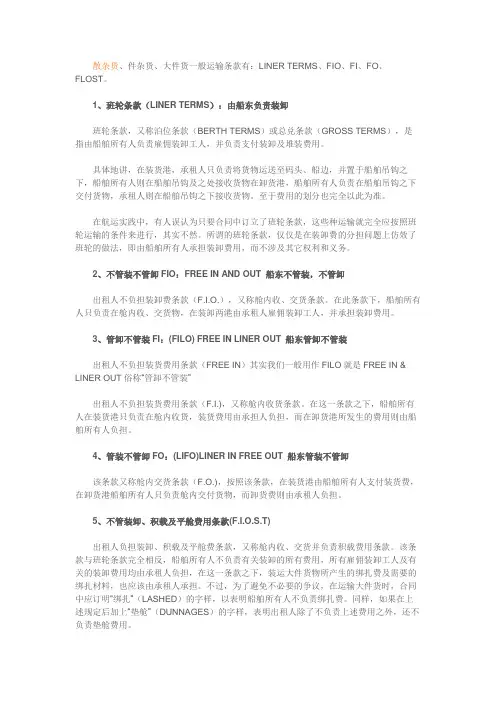
散杂货、件杂货、大件货一般运输条款有:LINER TERMS、FIO、FI、FO、FLOST。
1、班轮条款(LINER TERMS):由船东负责装卸班轮条款,又称泊位条款(BERTH TERMS)或总兑条款(GROSS TERMS),是指由船舶所有人负责雇佣装卸工人,并负责支付装卸及堆装费用。
具体地讲,在装货港,承租人只负责将货物运送至码头、船边,并置于船舶吊钩之下,船舶所有人则在船舶吊钩及之处接收货物在卸货港,船舶所有人负责在船舶吊钩之下交付货物,承租人则在船舶吊钩之下接收货物。
至于费用的划分也完全以此为准。
在航运实践中,有人误认为只要合同中订立了班轮条款,这些种运输就完全应按照班轮运输的条件来进行,其实不然。
所谓的班轮条款,仅仅是在装卸费的分担问题上仿效了班轮的做法,即由船舶所有人承担装卸费用,而不涉及其它权利和义务。
2、不管装不管卸FIO:FREE IN AND OUT 船东不管装,不管卸出租人不负担装卸费条款(F.I.O.),又称舱内收、交货条款。
在此条款下,船舶所有人只负责在舱内收、交货物,在装卸两港由承租人雇佣装卸工人,并承担装卸费用。
3、管卸不管装FI:(FILO) FREE IN LINER OUT 船东管卸不管装出租人不负担装货费用条款(FREE IN)其实我们一般用作FILO就是FREE IN & LINER OUT俗称“管卸不管装”出租人不负担装货费用条款(F.I.),又称舱内收货条款。
在这一条款之下,船舶所有人在装货港只负责在舱内收货,装货费用由承担人负担,而在卸货港所发生的费用则由船舶所有人负担。
4、管装不管卸FO:(LIFO)LINER IN FREE OUT 船东管装不管卸该条款又称舱内交货条款(F.O.),按照该条款,在装货港由船舶所有人支付装货费,在卸货港船舶所有人只负责舱内交付货物,而卸货费则由承租人负担。
5、不管装卸、积载及平舱费用条款(F.I.O.S.T)出租人负担装卸、积载及平舱费条款,又称舱内收、交货并负责积载费用条款。
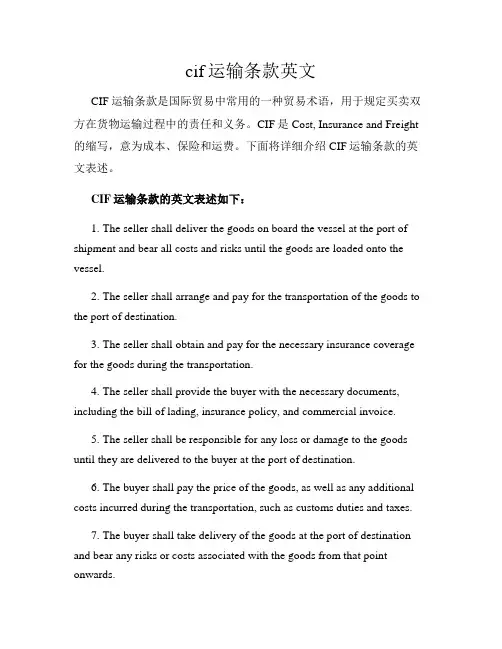
cif运输条款英文CIF运输条款是国际贸易中常用的一种贸易术语,用于规定买卖双方在货物运输过程中的责任和义务。
CIF是Cost, Insurance and Freight 的缩写,意为成本、保险和运费。
下面将详细介绍CIF运输条款的英文表述。
CIF运输条款的英文表述如下:1. The seller shall deliver the goods on board the vessel at the port of shipment and bear all costs and risks until the goods are loaded onto the vessel.2. The seller shall arrange and pay for the transportation of the goods to the port of destination.3. The seller shall obtain and pay for the necessary insurance coverage for the goods during the transportation.4. The seller shall provide the buyer with the necessary documents, including the bill of lading, insurance policy, and commercial invoice.5. The seller shall be responsible for any loss or damage to the goods until they are delivered to the buyer at the port of destination.6. The buyer shall pay the price of the goods, as well as any additional costs incurred during the transportation, such as customs duties and taxes.7. The buyer shall take delivery of the goods at the port of destination and bear any risks or costs associated with the goods from that point onwards.8. The buyer shall be responsible for any additional costs incurred after the goods have been delivered to the port of destination, such as storage fees or demurrage charges.9. The buyer shall be responsible for any import duties or taxes imposed by the customs authorities at the port of destination.10. Any disputes arising from the interpretation or implementation of this contract shall be settled through negotiation or arbitration.以上是CIF运输条款的英文表述,该条款明确了买卖双方在货物运输过程中的责任和义务。
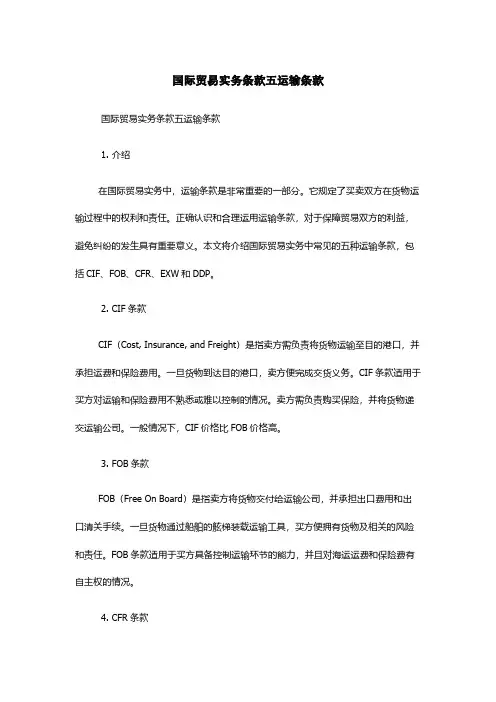
国际贸易实务条款五运输条款国际贸易实务条款五运输条款1. 介绍在国际贸易实务中,运输条款是非常重要的一部分。
它规定了买卖双方在货物运输过程中的权利和责任。
正确认识和合理运用运输条款,对于保障贸易双方的利益,避免纠纷的发生具有重要意义。
本文将介绍国际贸易实务中常见的五种运输条款,包括CIF、FOB、CFR、EXW和DDP。
2. CIF条款CIF(Cost, Insurance, and Freight)是指卖方需负责将货物运输至目的港口,并承担运费和保险费用。
一旦货物到达目的港口,卖方便完成交货义务。
CIF条款适用于买方对运输和保险费用不熟悉或难以控制的情况。
卖方需负责购买保险,并将货物递交运输公司。
一般情况下,CIF价格比FOB价格高。
3. FOB条款FOB(Free On Board)是指卖方将货物交付给运输公司,并承担出口费用和出口清关手续。
一旦货物通过船舶的舷梯装载运输工具,买方便拥有货物及相关的风险和责任。
FOB条款适用于买方具备控制运输环节的能力,并且对海运运费和保险费有自主权的情况。
4. CFR条款CFR(Cost and Freight)是指卖方负责将货物运输至目的港口,并承担运费。
卖方在货物到达目的港口前,需要购买保险。
卖方完成交货义务的时间点是货物通过船舶的舷梯装载运输工具。
CFR条款适用于买方对国际运输和保险费用不熟悉或者难以控制的情况。
5. EXW条款EXW(Ex Works)是指卖方在自己的工厂或仓库交货,并将货物交付给买方指定的运输公司。
卖方在货物离开工厂或仓库之后,将无法控制货物的运输过程和风险。
买方需要承担所有的运输费用、保险费用以及进口清关费用。
EXW条款适用于买方对整个运输过程有充分的掌控力的情况。
6. DDP条款DDP(Delivered Duty Pd)是指卖方将货物送达买方指定的目的地,并承担运输过程中的所有费用和责任,包括运输费用、保险费用、进口清关费用以及在目的地交税。
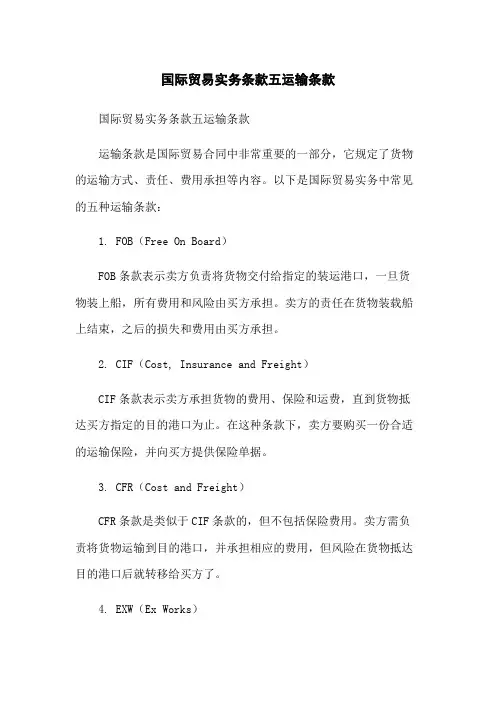
国际贸易实务条款五运输条款
国际贸易实务条款五运输条款
运输条款是国际贸易合同中非常重要的一部分,它规定了货物的运输方式、责任、费用承担等内容。
以下是国际贸易实务中常见的五种运输条款:
1. FOB(Free On Board)
FOB条款表示卖方负责将货物交付给指定的装运港口,一旦货物装上船,所有费用和风险由买方承担。
卖方的责任在货物装载船上结束,之后的损失和费用由买方承担。
2. CIF(Cost, Insurance and Freight)
CIF条款表示卖方承担货物的费用、保险和运费,直到货物抵达买方指定的目的港口为止。
在这种条款下,卖方要购买一份合适的运输保险,并向买方提供保险单据。
3. CFR(Cost and Freight)
CFR条款是类似于CIF条款的,但不包括保险费用。
卖方需负责将货物运输到目的港口,并承担相应的费用,但风险在货物抵达目的港口后就转移给买方了。
4. EXW(Ex Works)
EXW条款是卖方将货物提供给买方的最基本方式。
卖方只需将
货物准备好并使之可以取得,其余的运输手续、费用和风险都由买
方承担。
5. DDP(Delivered Duty Pd)
DDP条款要求卖方负责将货物运输到买方指定的地点,并承担
所有费用、税务和关税。
买方无需参与任何运输安排和费用支付。
以上是一些常见的国际贸易实务中的运输条款,根据具体情况
和双方需求选择合适的运输条款对于确保交易的顺利进行非常重要。
不同的运输条款会对双方的责任和费用承担产生影响,在签订合同
前需要认真考虑和协商。
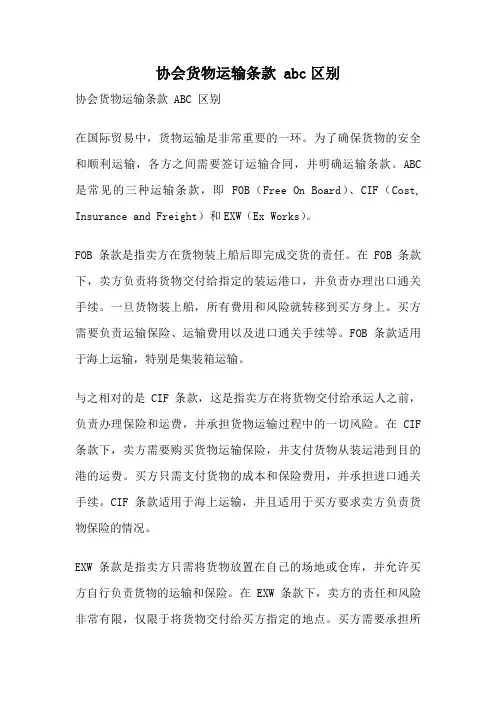
协会货物运输条款 abc区别协会货物运输条款 ABC 区别在国际贸易中,货物运输是非常重要的一环。
为了确保货物的安全和顺利运输,各方之间需要签订运输合同,并明确运输条款。
ABC 是常见的三种运输条款,即 FOB(Free On Board)、CIF(Cost, Insurance and Freight)和EXW(Ex Works)。
FOB 条款是指卖方在货物装上船后即完成交货的责任。
在FOB 条款下,卖方负责将货物交付给指定的装运港口,并负责办理出口通关手续。
一旦货物装上船,所有费用和风险就转移到买方身上。
买方需要负责运输保险、运输费用以及进口通关手续等。
FOB 条款适用于海上运输,特别是集装箱运输。
与之相对的是CIF 条款,这是指卖方在将货物交付给承运人之前,负责办理保险和运费,并承担货物运输过程中的一切风险。
在CIF 条款下,卖方需要购买货物运输保险,并支付货物从装运港到目的港的运费。
买方只需支付货物的成本和保险费用,并承担进口通关手续。
CIF 条款适用于海上运输,并且适用于买方要求卖方负责货物保险的情况。
EXW 条款是指卖方只需将货物放置在自己的场地或仓库,并允许买方自行负责货物的运输和保险。
在EXW 条款下,卖方的责任和风险非常有限,仅限于将货物交付给买方指定的地点。
买方需要承担所有运输费用、保险费用以及进口通关手续。
EXW 条款适用于国内运输和买方自行安排货物运输的情况。
FOB、CIF 和EXW 是常见的协会货物运输条款。
FOB 条款适用于海上运输,卖方的责任在货物装上船后结束;CIF 条款适用于海上运输,卖方需要负责货物保险和运费;而EXW 条款适用于国内运输,卖方仅需将货物交付给买方指定的地点。
买卖双方在选择运输条款时,应根据具体情况和需求进行权衡,并确保条款明确、合理,以避免不必要的纠纷和争议。
关于美加的O.C.P.运输条款O.C.P.是OVERLAND COMMON POINTS的缩写,是我国对美国签订贸易合同,在运输条款中经常见到的一个词语,是用来说明海上运输目的地的术语,译作"陆路共通点"。
所谓"陆路共通点",是指美国西海岸有陆路交通工具与内陆区域相联通的港口。
美国内陆区域,是以落基山脉为界,即除紧临太平洋的美国西部九个州以外,其以东地区均为适用O. C.P.的地区范围。
这个范围很广,约占美国全国三分之二的地区。
O.C.P.的运输过程就是我出口到美国的货物海运到美国西部港口(旧金山、西雅图,如到加拿大则为温哥华港)卸货,再通过陆路交通(主要是铁路)向东运至指定的内陆地点。
美国 O.C.P.运输条款规定,凡是经过美国西海岸指定港口转往内陆地区的货物,如果按照该条款运输,不仅可享受美国内陆地区运输的优惠运费率,同时也享受O.C.P.运输方式下优惠海运费,这就是O.C.P.方式运输对进出口双方都有利。
O.C.P. 运输方式的产生是美国航运业激烈竞争的结果。
美国西部开发后,行驶在该区的船公司和铁路公司为争揽美国东部航运公司的货源,联合拟定了比经巴拿马运河直达美国东海岸和墨西哥湾沿岸港口更为低廉的优惠航运价格,以便充分利用西部的运输条件来吸引货源。
起初,这一做法由美国铁路公司提供,以后逐步扩大了公路、航空等运输部门,发展成为一种成熟的航运惯例。
O.C.P.运输是一种特殊的国际运输方式。
它虽然由海运、陆运两种运输形式来完成,但它并不是也不属于国际多式联运。
国际多式联运是由一个承运人负责的自始至终的全程运输;而 O.C.P.运输,海运、陆运段分别由两个承运人签发单据,运输与责任风险也是分段负责。
因此,它并不符合国际多式联运的含义,它是一种国际多式的联营运输。
总之,O.C.P.运输是"为履行单一方式运输合同而进行的该合同所规定货物的接送业务,不应视为国际多式联运。
国际贸易术语英文解释适用于水上运输的术语四种:FAS 装运港船上交货FREE ALONGSIDE SHIP(named port of shipment)Free Alongside Ship" means that the seller delivers when the goods are placed alongside the vessel at the named port of shipment. This means that the buyer has to bear all costs and risks of loss of or damage to the goods from that moment.The FAS term requires the seller to clear the goods for export.THIS IS A REVERSAL FROM PREVIOUS INCOTERMS VERSIONS WHICH REQUIRED THE BUYER TO ARRANGE FOR EXPORT CLEARANCE.However, if the parties wish the buyer to clear the goods for export, this should be made clear by adding explicit wording to this effect in the contract of sale1.This term can be used only for sea or inland waterway transport.FOB 装运港船上交货FREE ON BOARD(... named port of shipment)“Free on Board" means that the seller delivers when the goods pass the ship''s rail at the named port of shipment. This means that the buyer has to bear all costs and risks of loss of or damage to the goods from that point. The FOB term requires the seller to clear the goods for export. This term can be used only for sea or inland waterway transport. If the parties do not intend to deliver the goods across the ship''s rail, the FCA term should he used.CFR 成本加运费COST AND FREIGHT( ... named port of destinaion)Cost and Freight means that the seller delivers when the goods pass the ship''s rail in the port of shipment.The seller must pay the costs and freight necessary to bring the goods to the paned port of destination BUT the risk of loss of or damage to the goods, as well as any additional costs due to events occurring after the time of delivery, we transferred from the seller to the buyer.The CFR term requires the seller to clear the goods for export.This term can he used only for sea and inland waterway transport. If the parties do not intend to deliver the goods across the ship''s rail, the CPT term should be used.CIFCOST, INSURANCE AND FREIGHT(... named port of destination)“Cost, Insurance and Freight" means that the seller delivers when the goods pass the ship''s rail in the port of shipment.The seller must pay the costs and freight necessary to bring the pods to the named port of destination BUT the risk of loss of or damage to the goods, as well as any additional costs due to events occurring after the time of delivery, are transferred from the seller to the buyer. However, inCIF the seller also has to procure marine insurance against the buyer''s risk of loss of or damage to the goods during the carriage.Consequently, the seller contracts for insurance and pays the insurance premium.The buyer should note that under the CIF term the seller is required to obligation insurance only on minimum cover1. Should the buyer wish to have the protection of greater cover, he would either need to agree as such expressly with the seller or to make his own extra insurance arrangements.The CIF term requires the seller to clear the goods for export.适用于任何运输方式的术语七种:EXW 工厂交货EX WORKS(... named place)“Ex works" means that the seller delivers when he places the goods at the disposal of the buyer at the seller'' s premises or another named place ( i. e. wa&s, factory, warehouse, etc. ) not cleared for export and not loaded on any collecting vehicle.This term thus represents the minimum obligation for the seller, and tile buyer has to bear all costs and risks involved m taking the goods from the seller''s premises.However, if the parties wish the seller to be responsible for the loading of the goods on departure and to bear the risks and all the costs of such loading, this should be made clear by adding explicit wording to this effect in the contract of sale1 . This term should not be used when the buyer cannot carry out the export formalities directly or indirectly. In such circumstances, the FCA term should be used, provided the seller agrees that he will load at his cost and risk.FCA货交承运人FREE CARRIER(... named place)"Free Carrier" means that the seller delivers the goods, cleared for export, to the carrier nominated by the buyer at the named place. It should be noted that the chosen place of delivery has an impact on the obligations of loading and unloading the goods at that place. If delivery occurs at the seller''s premises, the seller is responsible for loading. If delivery occurs at any other place, the seller is not responsible for unloading.Term may he used irrespective of the mode of transport, including multimodal transport. "Carrier" means any person who, in a contract of carriage, undertakes to perform orto procure the performance of transport by rail, road, air, sea, inland waterway or by a combination of such modes.If the buyer nominates a person other than a carrier to receive the goods, the seller is deemed to have fulfilled his obligation to deliver the goods when they me delivered to that person.CPT 运费付至目的地Carriage Paid To(d place of destination)"carriage paid to ..." means that the seller delivers the goods to the carrier nominated by him, butthe seller must in addition pay the cost of carriage necessary to bring the goods to the named destination. This means that the buyer bears aft risks and any other costs occurring after the goods have been so delivered."Carrier"means, who, in a contract of carriage,undertakes to perform or to procure the performance of transport, by rail, road, air, sea, inland waterway or by a combination of such modes. If subsequent carriers are used for the carriage to the agreed destination, the risk passes when the goods have been delivered to the first carrier.The CPT term requires the seller to clear the goods for export.This term may be used irrespective of the mode of transport including multimodal transport .CIP 运费/保险费付至目的地CARRIAGE AND INSURANCE PAID TO( ... named place of destination)¡°Carriage and Insurance paid to...¡±means that the seller delivers the goods the carrier nominated by him but the seller must m addition pay the cost of carriage necessary to bring the goods to the named destination. This means that the buyer bears all risks and any additional costs occurring after the goods have been so delivered. However, in CIP the seller also has to procure insurance against the buyer''s risk of loss of or damage to the goods during the carriage. Consequently, the seller contracts for insurance and pays the insurance premium.The buyer should note that under the CIP term the seller is required to obtain insurance only on minimum cover1. Should the buyer wish to have the protection of greater cover, he would either need to agree as such expressly with the seller or to make his own extra insurance arrangements. "Carrier" means any person who, in a contract of carriage, undertakes to perform or to procure the performance of transport, by rail, road, air, sea, inland waterway or by a combination of such modes.If subsequent carriers are used for the carriage to the agreed destination, the riskpasses when the goods have been delivered to the first carrier.The CIP term requires the seller to clear the goods for export.This term may he used irrespective of the mode of transport including multimodal transport.DDP 完税后交货DELIVERED DUTY PAID(... named place of destination)“Delivered duty paid" means that the seller delivers the goods to the buyer, for import, and not unloaded from any arriving means of transport at the named place of destination. The seller has to bear all the costs and risks involved bringing the goods thereto including, where applicable1 , any "duty" (which term includes the responsibility for and the risk of the carrying out of customs formalities and the payment of formalities, customs duties, taxes and other charges) for import m the country of destination.Whilst the EXW term represents the minimum obligation for the seller, DDP represents the maximum obligation.This term should not he used if the seller is unable directly or indirectly to obtain the importlicence.However, if the parties wish to exclude from the seller' s obligations some of the costs payable upon import of the goods (such as value-added tax : V A T), this should he made clear by adding explicit wording to this effect in the contract of sale2.If the parties wish the buyer to bear all risks and costs of the import, the DDU term should be used. This term may be used irrespective of the mode of transport but when delivery is to take place in the port of destination on board the vessel or on the quay (wharf), the DES or DEQ terms should he used.DA T:delivered at terminal 目的地或目的港集散站交货DAP:delivered at place 目的地交货。
货物运输中的国际货物运输条款解析随着全球化的发展,国际贸易日益频繁,货物运输在国际间的重要性也不断提升。
为了规范和保护各方的权益,在货物运输中,国际货物运输条款扮演了至关重要的角色。
本文将对国际货物运输条款进行解析,以便读者更好地理解和应用。
一、什么是国际货物运输条款?国际货物运输条款是指规范国际货物运输中各方权益、义务以及运输方式、费用分摊等方面的规定。
这些条款通常由国际贸易组织、国际商会或国际货运代理协会等制定,旨在为国际货物运输提供统一的规则和标准。
二、常见的国际货物运输条款有哪些?1. 国际商会《国际贸易术语解释通则》(Incoterms)Incoterms是国际贸易中最常见也是最广泛应用的国际货物运输条款之一。
它规定了买卖双方在货物交付、责任转移、费用承担等方面的权益和义务。
常见的Incoterms包括FOB、CIF、EXW等,每个术语都有具体的解释和适用范围。
2. 国际货物运输组织《海上运输上的普提顿条款》(HagueRules/Hague-Visby Rules)Hague Rules是国际货物运输领域最早的一套条款,于1924年颁布,后来修订为Hague-Visby Rules。
这一条款主要适用于海上运输,规定了运输人(承运人)在运输过程中的责任和义务,同时也对货物的损坏、丢失等情况进行了详细的规定。
3. 联合国国际货物销售合同规则(CISG)CISG是联合国制定的一套适用于国际货物销售的合同规则,适用于合同双方所在国都是CISG缔约国的情况下。
该规则涵盖了合同的成立、履行、违约等方面的内容,对国际货物销售提供了统一的规范。
三、国际货物运输条款的作用和意义1. 统一规则:国际货物运输条款为全球范围内的货物运输提供了一套统一的规则,使各方在交易中能够共同遵循,并降低了因文化和法律差异而产生的纠纷。
2. 权益保护:国际货物运输条款明确了各方在运输过程中的权益和义务,为合同双方提供了法律保护。
海运条款cif-概述说明以及解释1.引言1.1 概述概述部分的内容可以包括以下内容:CIF条款是国际贸易中常用的海运术语之一,它是指卖方将货物按约定装船,并负责将货物运输到目的港口的费用和风险转移给买方的一种贸易方式。
CIF即Cost, Insurance and Freight的缩写,表示卖方负责支付货物的成本、保险费及运费。
CIF条款适用于买卖双方之间的国际贸易合同,特别适用于货物的海洋运输。
在CIF条款下,卖方需要按照约定负责将货物装上船只,并承担所涉及的费用和风险,直到货物到达目的港口为止。
CIF条款的定义在国际贸易中具有一定的标准化,一般包括卖方负责合理包装货物、运输费用、货物在途中的保险费用、传递运输单据等方面的责任。
CIF条款的适用范围较广泛,一般适用于海运货物的交易。
它对于买方来说,无疑是一种较为有利的方式,因为卖方承担了所有货物运输过程中的费用和风险。
然而,卖方在选择CIF条款时需要注意风险的转移时间和责任的分担。
在本文中,我们将对CIF条款进行详细介绍,包括其定义和适用范围,并探讨CIF条款的优点和注意事项。
希望通过本文的阅读,读者可以更好地理解和应用CIF条款,从而在国际贸易中取得更好的效益。
1.2文章结构文章结构部分的内容应该为:在本文中,我们将按照以下顺序讨论CIF条款。
首先,我们将对CIF 条款进行定义,并解释它在海运业务中的具体含义。
然后,我们将探讨CIF 条款的适用范围,以便读者了解在什么情况下可以使用这种条款。
接下来,我们将详细分析CIF条款的优点,包括它在贸易中的作用和其它相关优势。
最后,我们将就使用CIF条款时需要特别注意的事项进行讨论,以便读者能够了解如何正确使用这一条款以及如何避免潜在的问题。
通过这样的结构安排,我们可以全面探讨CIF条款,并为读者提供相关的解释和指导。
1.3 目的海运条款CIF(Cost, Insurance and Freight)是国际贸易中常用的一种贸易术语,用于规定货物的交付和支付方式。
集装箱运输条款中CY/CY 、 CY/FO、 CY/LO、CY/TACKLE、CY/HOOK解释
1.CY/CY是指堆场到堆场方式,承运人在装货港集装箱堆场接收整箱货物并负责运至卸货港集装箱堆场整箱交付收货人; 2 .CY/Fo(free out)承运人在装货港集装箱堆场接收整箱货物并负责运至卸货港但不负责卸货; 3.CY/LO (line out)承运人在装货港集装箱堆场接收整箱货物并负责运至卸货港卸货; 4.CY/TACKLE承运人在装货港集装箱堆场接收整箱货物并负责运至卸货港卸货至接货车上; 5.CY/HOOK承运人在装货港集装箱堆场接收整箱货物并负责运至卸货港卸货,此处当吊臂吊下货物后服务终止。
国际贸易术语英文解释适用于水上运输的术语四种:FAS 装运港船上交货FREE ALONGSIDE SHIP(named port of shipment)Free Alongside Ship" means that the seller delivers when the goods are placed alongside the vessel at the named port of shipment. This means that the buyer has to bear all costs and risks of loss of or damage to the goods from that moment.The FAS term requires the seller to clear the goods for export.THIS IS A REVERSAL FROM PREVIOUS INCOTERMS VERSIONS WHICH REQUIRED THE BUYER TO ARRANGE FOR EXPORT CLEARANCE.However, if the parties wish the buyer to clear the goods for export, this should be made clear by adding explicit wording to this effect in the contract of sale1.This term can be used only for sea or inland waterway transport.FOB 装运港船上交货FREE ON BOARD(... named port of shipment)“Free on Board" means that the seller delivers when the goods pass the ship''s rail at the named port of shipment. This means that the buyer has to bear all costs and risks of loss of or damage to the goods from that point. The FOB term requires the seller to clear the goods for export. This term can be used only for sea or inland waterway transport. If the parties do not intend to deliver the goods across the ship''s rail, the FCA term should he used.CFR 成本加运费COST AND FREIGHT( ... named port of destinaion)Cost and Freight means that the seller delivers when the goods pass the ship''s rail in the port of shipment.The seller must pay the costs and freight necessary to bring the goods to the paned port of destination BUT the risk of loss of or damage to the goods, as well as any additional costs due to events occurring after the time of delivery, we transferred from the seller to the buyer.The CFR term requires the seller to clear the goods for export.This term can he used only for sea and inland waterway transport. If the parties do not intend to deliver the goods across the ship''s rail, the CPT term should be used.CIFCOST, INSURANCE AND FREIGHT(... named port of destination)“Cost, Insurance and Freight" means that the seller delivers when the goods pass the ship''s rail in the port of shipment.The seller must pay the costs and freight necessary to bring the pods to the named port of destination BUT the risk of loss of or damage to the goods, as well as any additional costs due to events occurring after the time of delivery, are transferred from the seller to the buyer. However, inCIF the seller also has to procure marine insurance against the buyer''s risk of loss of or damage to the goods during the carriage.Consequently, the seller contracts for insurance and pays the insurance premium.The buyer should note that under the CIF term the seller is required to obligation insurance only on minimum cover1. Should the buyer wish to have the protection of greater cover, he would either need to agree as such expressly with the seller or to make his own extra insurance arrangements.The CIF term requires the seller to clear the goods for export.适用于任何运输方式的术语七种:EXW 工厂交货EX WORKS(... named place)“Ex works" means that the seller delivers when he places the goods at the disposal of the buyer at the seller'' s premises or another named place ( i. e. wa&s, factory, warehouse, etc. ) not cleared for export and not loaded on any collecting vehicle.This term thus represents the minimum obligation for the seller, and tile buyer has to bear all costs and risks involved m taking the goods from the seller''s premises.However, if the parties wish the seller to be responsible for the loading of the goods on departure and to bear the risks and all the costs of such loading, this should be made clear by adding explicit wording to this effect in the contract of sale1 . This term should not be used when the buyer cannot carry out the export formalities directly or indirectly. In such circumstances, the FCA term should be used, provided the seller agrees that he will load at his cost and risk.FCA 货交承运人FREE CARRIER(... named place)"Free Carrier" means that the seller delivers the goods, cleared for export, to the carrier nominated by the buyer at the named place. It should be noted that the chosen place of delivery has an impact on the obligations of loading and unloading the goods at that place. If delivery occurs at the seller''s premises, the seller is responsible for loading. If delivery occurs at any other place, the seller is not responsible for unloading.Term may he used irrespective of the mode of transport, including multimodal transport. "Carrier" means any person who, in a contract of carriage, undertakes to perform orto procure the performance of transport by rail, road, air, sea, inland waterway or by a combination of such modes.If the buyer nominates a person other than a carrier to receive the goods, the seller is deemed to have fulfilled his obligation to deliver the goods when they me delivered to that person.CPT 运费付至目的地Carriage Paid To(d place of destination)"carriage paid to ..." means that the seller delivers the goods to the carrier nominated by him, butthe seller must in addition pay the cost of carriage necessary to bring the goods to the named destination. This means that the buyer bears aft risks and any other costs occurring after the goods have been so delivered."Carrier"means, who, in a contract of carriage,undertakes to perform or to procure the performance of transport, by rail, road, air, sea, inland waterway or by a combination of such modes. If subsequent carriers are used for the carriage to the agreed destination, the risk passes when the goods have been delivered to the first carrier.The CPT term requires the seller to clear the goods for export.This term may be used irrespective of the mode of transport including multimodal transport .CIP 运费/保险费付至目的地CARRIAGE AND INSURANCE PAID TO( ... named place of destination)¡°Carriage and Insurance paid to...¡±means that the seller delivers the goods the carrier nominated by him but the seller must m addition pay the cost of carriage necessary to bring the goods to the named destination. This means that the buyer bears all risks and any additional costs occurring after the goods have been so delivered. However, in CIP the seller also has to procure insurance against the buyer''s risk of loss of or damage to the goods during the carriage. Consequently, the seller contracts for insurance and pays the insurance premium.The buyer should note that under the CIP term the seller is required to obtain insurance only on minimum cover1. Should the buyer wish to have the protection of greater cover, he would either need to agree as such expressly with the seller or to make his own extra insurance arrangements. "Carrier" means any person who, in a contract of carriage, undertakes to perform or to procure the performance of transport, by rail, road, air, sea, inland waterway or by a combination of such modes.If subsequent carriers are used for the carriage to the agreed destination, the riskpasses when the goods have been delivered to the first carrier.The CIP term requires the seller to clear the goods for export.This term may he used irrespective of the mode of transport including multimodal transport.DDP 完税后交货DELIVERED DUTY PAID(... named place of destination)“Delivered duty paid" means that the seller delivers the goods to the buyer, for import, and not unloaded from any arriving means of transport at the named place of destination. The seller has to bear all the costs and risks involved bringing the goods thereto including, where applicable1 , any "duty" (which term includes the responsibility for and the risk of the carrying out of customs formalities and the payment of formalities, customs duties, taxes and other charges) for import m the country of destination.Whilst the EXW term represents the minimum obligation for the seller, DDP represents the maximum obligation.This term should not he used if the seller is unable directly or indirectly to obtain the importlicence.However, if the parties wish to exclude from the seller' s obligations some of the costs payable upon import of the goods (such as value-added tax : V A T), this should he made clear by adding explicit wording to this effect in the contract of sale2.If the parties wish the buyer to bear all risks and costs of the import, the DDU term should be used. This term may be used irrespective of the mode of transport but when delivery is to take place in the port of destination on board the vessel or on the quay (wharf), the DES or DEQ terms should he used.DA T:delivered at terminal 目的地或目的港集散站交货DAP:delivered at place 目的地交货。